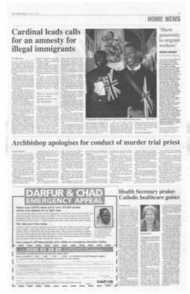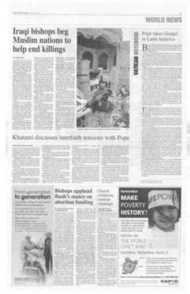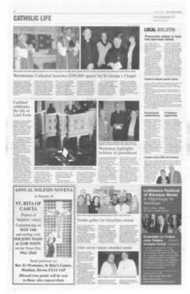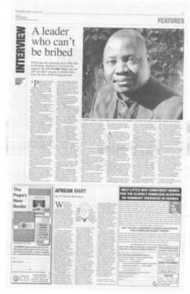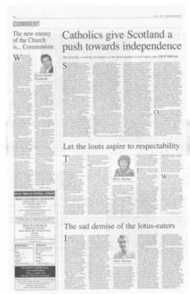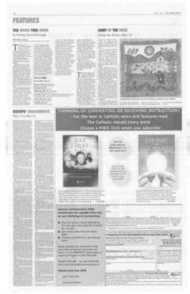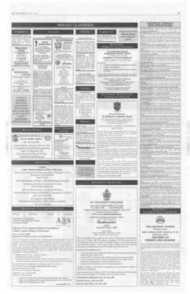Page 9, 11th May 2007
Page 9

Report an error
Noticed an error on this page?If you've noticed an error in this article please click here to report it.
Tags
Share
Related articles
Two Faces Of Kenya
African Diary
Kenya's
Dignitary Runs For The Poor
Water For A Thirsty Land
Stepping in for a lost generation
Jane Lennon reports from Kenya on how Cafod is helping families shattered by Aids
The 4x4 bounces along the uneven road surface heading for the village of Kirai, an hour's drive outside Kenya's capital city, Nairobi. As the heat beats down and the dust trail from the vehicle rises up into the air, the 4x4 passes roadside stalls selling pyramids of gleaming mangos, pungent bananas, dried blackened meat and small children who wave energetically or chase a few yards down the dirt track road.
It is a sobering thought that by the year 2010 one in 10 children in sub-Saharan Africa will have lost one or both parents to Aids – accounting for 29 million orphans. The human face of this somewhat incomprehensible statistic is Turira and her husband John.
As you approach their home in Kirai you are greeted by chickens, scratching about on the dried earth for whatever scraps they can peck at, and a sea of smiling children's faces. You'd be forgiven for thinking that this was the local primary school; in fact, the 10 children all belong to Turira, a tall, strong woman, and her husband John, a slim man who seems calm and contented, despite being recently injured and unable to work. They have four girls, three of whom have learning disabilities, and six grandchildren from two daughters who have died from Aids-related illnesses. In addition to these children there is also a great-grandchild living with them.
Sister Helen Kisolo from the Assumption Sisters in Thika (one of Cafod's local partners in Kenya) has been supporting Turira and John and many other families like theirs who find themselves bringing up and caring for a family second time round in old age. They talk of how hard it is to be guardians for all the children at their age (they are already older than the average life expectancy in Kenya).
Turira says: "It took a lot of time to create good relationships and to bring all the children to love together as one family and understand each other."
Despite the challenges and difficulties they have faced, and still face, the family is very positive. The sounds of children's laughter and squabbling ring out from the yard as they go about their daily house chores.
The Assumption Sisters in Thika have been able to support Turira and John by providing seeds and fertiliser for the family to cultivate small vegetable plots.
Sister Helen says: "Providing a family with just a small amount of seeds and equipment means they can become self-sufficient and healthier."
John proudly shows the crops the family has grown. "We have already harvested enough beans to make 40 pots," he explains.
The family also has a goat, which lives in a run just next to the front door of their home. With this kind of support Turira and John are not left feeling daunted by the task of caring for their extended young family. They are able to ensure that the children go to school and their young hopes and dreams of a better future are kept alive.
Some of the children are keen to talk about their lives and hopes. Pauline, who is 14, likes playing football and netball and wants to be a nurse one day. Eliud, who is 15, wants to be a pilot; and John, who is nine, wants to be a truck driver. They describe how they and the other children walk the hour and a half to Mutuma Primary School each morning, leaving their house at 6 am to be there in time for classes. They are not complaining though; it's just how they get to school.
Turira, John and the children are able to live in dignity in spite of the tragedies they have been through. This kind of practical assistance is one of the ways in which Cafod supports children and families affected by 14IV and Aids. Of course, there is often also a need for more emotional support, which the Assumption Sisters also provide through activities such as therapy groups and training community Volunteers.
Sister Helen says: "An important part of providing support to families is also being able to provide a space for the family members to talk about how they are coping and to express their emotional feelings.
"We provide therapy support groups for men and for women and also for children who have been orphaned. We used to have mixed groups but found that only women went to these!"
Turira's family situation is, unfortunately, not unusual in Kenya. and offers an example of how very few families and communities escape the impact of HIV and Aids in a country where over six per cent of the population are living with the virus.
A recent report from the World Health Organization estimates that one-fifth of all organisations engaged in HIV programming are faith-based, providing up to 70 per cent of the total healthcare in many African countries. It highlights the need for greater recognition of the work of faith-based organisations in supporting HIV and Aids programmes in developing countries.
Religious "assets" are often overlooked by national and international policy-makers and there needs to be greater understanding of both the tangible and intangible support provided by groups such as these sisters in Kenya.
Jane Lennon is Cafod's HIV Knowledge and Network Coordinator
blog comments powered by Disqus




